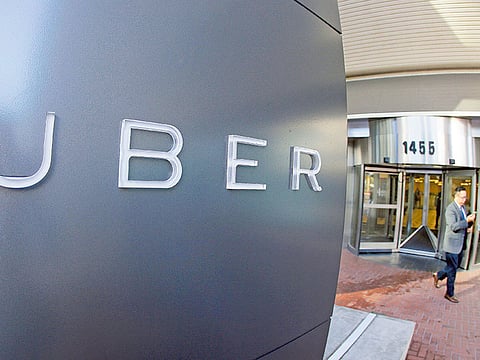Saudi Arabia wealth fund invests $3.5b in Uber
Gulf country seeking to diversify assets with more overseas acquisitions

San Francisco, Riyadh: Saudi Arabia’s sovereign wealth fund made its highest-profile deal, investing $3.5 billion (Dh12.85 billion) in US ride-share company Uber Technologies Inc. as the country seeks to diversify its assets with more overseas acquisitions.
Yasir Al Rumayyan, managing director of the Public Investment Fund, will take a board seat at the San Francisco-based company after the deal, which values Uber at $62.5 billion, the company said in a statement.
It’s also the biggest investment Uber has received to date and in line with the company’s previous valuation.
The deal marks a further step in Saudi Arabia’s plans to shake up its wealth fund, which until recently focused on investing at home.
The fund, which controls about $200 billion in assets, plans to boost its share of overseas holdings to about half by 2020 from five per cent now, with Al Rumayyan spearheading a drive to recruit international bankers for the expansion.
“We’re focused on achieving attractive long-term financial returns from our investments,” Al Rumayyan said in a statement. In July, the fund took a 38 per cent stake in Korea’s Posco Engineering & Construction Co. for $1.1 billion and also plans to invest in Russia. The fund may eventually control $2 trillion once ownership of oil giant Saudi Aramco has been transferred, according to Deputy Crown Prince Mohammed bin Salman.
Uber joins competitors in securing investment globally as the popularity of ride-hailing services surges. Lyft Inc., the second-largest ride-hailing company in the US, has raised at least $100 million from Saudi Arabian billionaire Prince Al Waleed Bin Talal’s Kingdom Holding Co.
Chinese competitor
Jean Liu, President of Chinese ride-hailing company Didi and Uber’s biggest global competitor, is working on closing a funding round of more than $3.5 billion, according to comments made Wednesday in California. Didi said last month it would raise $1 billion from Apple Inc. while Alibaba Group Holding Ltd. and its finance affiliate invested another $400 million. India’s Ola is also spending aggressively on expansion.
Uber expanded its previous financing round to include the investment from Saudi Arabia’s Public Investment Fund. The money brings Uber’s total balance sheet, including cash and convertible debt, to more than $11 billion, the company said. The cash infusion helps the company push off the need to go public.
Uber is currently operating in nine countries and 15 cities in the Middle East and North Africa. The company said it has committed to investing $250 million in the region. It’s continuing to spend much more than that in China and India.
Saudi services
Uber is expanding in Saudi Arabia, where the app’s popularity among women has created one of its fastest-growing markets. The company is aiming for growth of 50 per cent to 60 per cent in trips per month in 2016, versus estimated gains of 25 per cent to 40 per cent last year, Majid Abu Khater, head of Saudi operations, said in January.
There’s some opposition to its services, which offer alternative transport options for women, who can’t drive in the kingdom but have an increasing role in the economy, Abu Khater said. Some Saudi municipal and business-lobby leaders have said services such as Uber and regional competitor Careem are illegal or need closer oversight.
PIF, which was set up in 1971, holds the government’s stakes in companies including Saudi Basic Industries Corp., the world’s second-biggest chemicals manufacturer, and National Commercial Bank, the Middle East’s second-largest lender.
Since the fund was transferred last year to the Council for Economic and Development Affairs from the Ministry of Finance, it has started playing a prominent role in the country’s investment strategy. A unit in February established five joint ventures with international defence companies to make military hardware.



